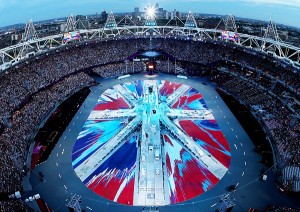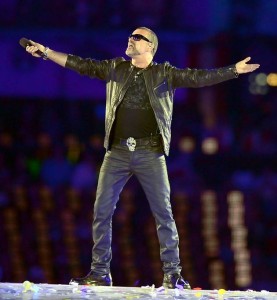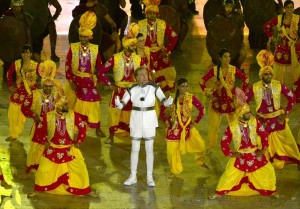Little England: The London 2012 Closing Ceremony
In keeping with the Shakespearean shadow that loomed over both ceremonies of the 2012 London Olympic and Paralympic Games, if the opening ceremony was full of sound and fury, the closing ceremony signified nothing.
 This is by no means to suggest that Kim Gavin, the director of the closing ceremony, is a tale-telling idiot, considering his impressive c.v. as director and choreographer, including massive events staged at Wembley Stadium (such as the 2007 Concert for Diana and Take That’s Circus tour appearance in 2009). But when seen through the lens of Danny Boyle’s triumphant opening ceremony that conjured a childlike view of Britain where healthy fun is made (“Chariots of Fire” with flatulent coda); where juxtapositions thrive, whether goofy (James Bond with the Queen), fascinating (Dizzee Rascal with Elgar), or weirdly profound (Kes with Four Weddings and a Funeral); and where an acute sense of right and wrong endures; when seen through this lens, one cannot help feel let down.
This is by no means to suggest that Kim Gavin, the director of the closing ceremony, is a tale-telling idiot, considering his impressive c.v. as director and choreographer, including massive events staged at Wembley Stadium (such as the 2007 Concert for Diana and Take That’s Circus tour appearance in 2009). But when seen through the lens of Danny Boyle’s triumphant opening ceremony that conjured a childlike view of Britain where healthy fun is made (“Chariots of Fire” with flatulent coda); where juxtapositions thrive, whether goofy (James Bond with the Queen), fascinating (Dizzee Rascal with Elgar), or weirdly profound (Kes with Four Weddings and a Funeral); and where an acute sense of right and wrong endures; when seen through this lens, one cannot help feel let down.
And, for the most part, let down horribly we were. Since the ceremony aired on 12 August, other critics have discussed its dullness and laziness, as well as its lack of narrative thrust. This latter fact is to be expected, considering that, unlike with the opening ceremony, there were no clear narrative markers. So, for instance, Blur’s “Parklife,” as performed by the Massed Band of the Household Division, following Madness performing “Our House” (complete with flying harness saxophone solo) was arguably done for the sake of spectacle, one fabulous element of “the best aftershow party there has ever been” (as Gavin himself claimed before the ceremony aired), rather than to explore variations on a theme.
But it is the two former qualities mentioned above that I found especially egregious in the closing ceremony’s view of Britain. Called  “A Symphony of British Music” (a title arguably loaded with class connotations), the (mostly English) music chosen for the ceremony reminded me of Theodor Adorno’s formulation in “On Popular Music,” that “the composition hears for the listener.” Mechanized and standardized pop is an easy target, to be fair, considering the Simons (Cowell and Fuller) made their svengali presence known with the appearance of One Direction and the Spice Girls, boy- and girl-bands whose bots were chosen for such ill-defined marketable reasons as “demographic appeal.” But on an aesthetic level, the musical choices and performances were so bland as to be unmemorable. True, George Michael’s initial offering (“Freedom ’90”) teased tantalizingly electric proceedings, but this symphony sounded off-key.
“A Symphony of British Music” (a title arguably loaded with class connotations), the (mostly English) music chosen for the ceremony reminded me of Theodor Adorno’s formulation in “On Popular Music,” that “the composition hears for the listener.” Mechanized and standardized pop is an easy target, to be fair, considering the Simons (Cowell and Fuller) made their svengali presence known with the appearance of One Direction and the Spice Girls, boy- and girl-bands whose bots were chosen for such ill-defined marketable reasons as “demographic appeal.” But on an aesthetic level, the musical choices and performances were so bland as to be unmemorable. True, George Michael’s initial offering (“Freedom ’90”) teased tantalizingly electric proceedings, but this symphony sounded off-key.
Perhaps this was because of the unpreprocessed emotion of the 17 days’ worth of athletics which came before the closing ceremony: the best efforts of NBC, the BBC, and Tumblr aside, it’s impossible to recreate the glorious spontaneity of Mo Farah’s wide-eyed beaming, McKayla Maroney’s devilish moue, or Jessica Ennis’ tears in a massive pyrotechnic-sprayed choreography explosion. In stark contrast, the “spontaneous” moments of “cheeky” juxtaposition in the closing ceremonies (Fatboy Slim on a giant octopus! Annie Lennox on a ghost ship! Russell Brand on a bus!) seemed less childlike than familiar, focus-grouped to within a note of its life, with the intention of pleasing everybody and ending up pleasing very few people at all.
 As a result, what could have been a chance to celebrate the achievements of the multicultural parade of athletes that entered the stadium (for me, the only moment in the closing ceremony that gestured towards Boyle’s humanistic vision in the opening ceremony) ended up being an empty charade of tired (at best) and xenophobic (at worst) performances, of which Eric Idle’s attempt at bhangra, where the object of the unhealthy fun was the unnatural and exotic movements of the dancers and not the white person attempting them, was the most glaring.
As a result, what could have been a chance to celebrate the achievements of the multicultural parade of athletes that entered the stadium (for me, the only moment in the closing ceremony that gestured towards Boyle’s humanistic vision in the opening ceremony) ended up being an empty charade of tired (at best) and xenophobic (at worst) performances, of which Eric Idle’s attempt at bhangra, where the object of the unhealthy fun was the unnatural and exotic movements of the dancers and not the white person attempting them, was the most glaring.
What is more, if the opening ceremony used the past to remind us that a nation’s evolution depends often on the marginalized (not for nothing did Boyle include suffragettes, Afro-Caribbean immigrants, and trade unionists in its opening sequence), the closing ceremony used the past only as an old newspaper from which reassuring headlines and articles could be clipped. From the tie-dyed Union Jack painted on the floor of Olympic Stadium, to the Michael Caine quotation from The Italian Job (Peter Collinson, 1969) that began the night, to the tributes to John Lennon and Freddie Mercury, to the appearances of the Who and Pet Shop Boys, to the inclusion of songs by David Bowie and Electric Light Orchestra and Kate Bush and the Bee Gees, to the recreation of the cover of Pink Floyd’s 1975 album Wish You Were Here: ultimately, these backward-looking and regressive beats seemed like the expressions of a nation of Little Englanders, wanting nothing more than a return to the insular “good old days,” before the Eurozone crisis and the riots.
A more progressive ceremony, one closer to the vision of London 2012 proposed by Boyle on 27 July, might have highlighted more contemporary performers like Emeli Sandé, Taio Cruz, and Tinie Tempeh (all of whom, to be fair, sang more than one number during the evening), a musical Team GB whose multicultural background and thrilling sounds would undoubtedly make Conservative MP Aidan Burley and Daily Mail scribblers collapse in race- gender- and class-based heaps of fury. And that would signify everything.



I was truly horrified at the bhangra. Monty Python is one of my most favorite things of all time, and (you hit the point, Mr. Bleach) its satire pointed in all of the wrong directions.